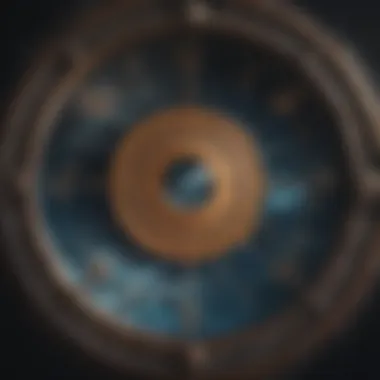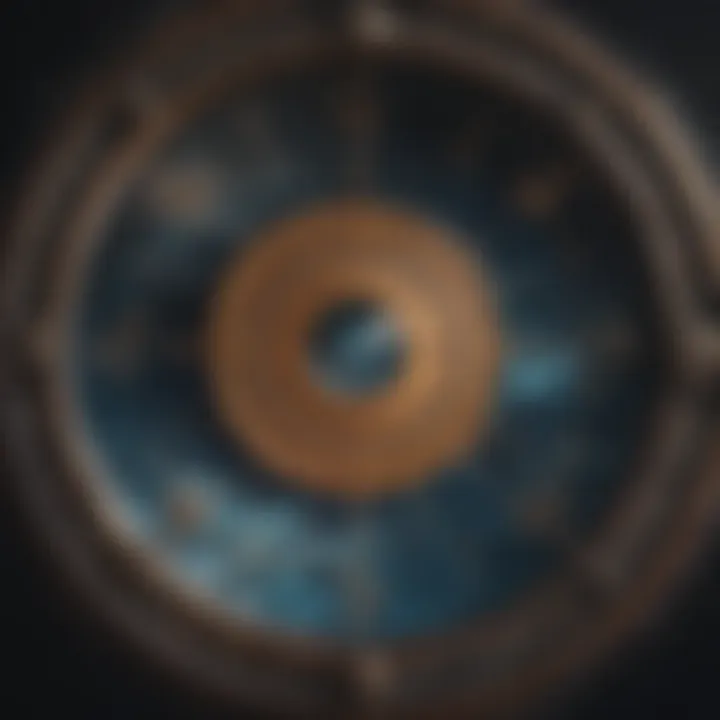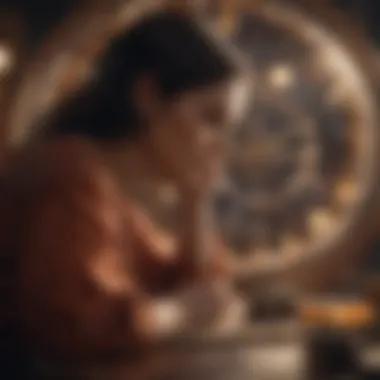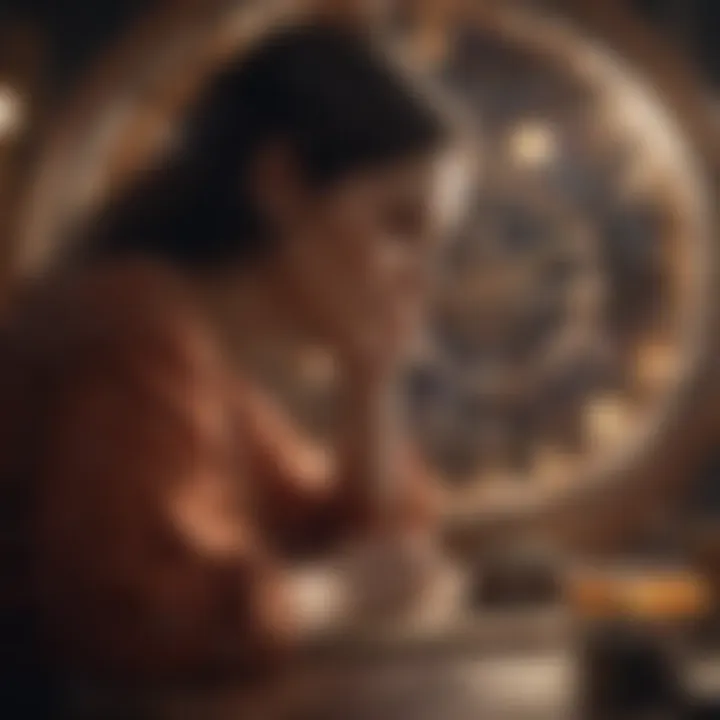Exploring the Depths of Horoscopes: A Comprehensive Guide


Intro
Horoscopes have long been a topic that stirs curiosity and skepticism in equal measure. Many people glance at their daily readings in papers or online, sometimes dismissing it as mere entertainment. Yet, underneath that surface level exists a rich tapestry of history, culture, and nuanced understanding that beckons for exploration.
In this piece, we'll delve into the origins of astrology, its methodologies, and how it finds relevance in the contemporary landscape of personal and relational dynamics. Expect a journey through the intricate relationships between celestial bodies and the human experience.
By peeling back the layers, we aim to illuminate how astrological signs inform personality traits, and how planetary movements can sway decisions and emotions, often in ways we might not readily acknowledge. Whether you're a seasoned astrologer, a curious novice, or someone simply looking to foster a deeper connection with the cosmos, this guide will provide a wealth of insights, breaking down complex concepts into digestible portions.
Prepare to uncover the depths of horoscopes. Let's get started.
Prelims to Horoscopes
In today’s fast-paced world, horoscopes sometimes get a bad rap, being dismissed as vague predictions or mere entertainment. Yet, their roots and significance run much deeper. The exploration of horoscopes invites us to examine not just celestial configurations, but the historical context that has shaped humanity’s relationship with the cosmos. Understanding horoscopes can be incredibly illuminating, allowing individuals to tap into a well of insight regarding personality traits, potential challenges, and unique life paths.
Horoscopes serve as a bridge between ancient wisdom and modern application. They offer not just forecasts but also tools for self-reflection and growth. By diving into the intricacies of how horoscopes come about, we can appreciate their potential in guiding decision-making processes and enhancing self-awareness. The importance of this section lies in laying the groundwork for a fuller understanding of astrology, ensuring we grasp the delicate threads connecting our lives to the universe.
Defining Horoscopes
Horoscopes are cleclearly defined as astrological charts that are derived from the positions of celestial bodies at specific times, such as the moment of one’s birth. They encapsulate an individual’s zodiac sign, using it as a lens through which to interpret their characteristics, behavior patterns, and potential life experiences. This personalized chart offers insights into various facets of one’s life, from relationships to career, and even health.
Historical Context
The pull of astrology has always been reputable, resonating through various civilizations over the centuries.
Astrology in Ancient Civilizations
In ancient civilizations like Mesopotamia, Egypt, and Greece, astrology was intertwined with religious beliefs and societal norms. These cultures believed the movements of planets and stars directly influenced human affairs. For example, the Babylonians meticulously documented celestial events, laying the groundwork for horoscopic practices that many follow today.
Their interpretations were not merely predictive but often served sociopolitical needs, aligning rulers’ decisions with cosmic events. This ancient practice shows the longevity and importance of astrological belief systems as a tool for understanding our place in the universe. With such a historical framework, it becomes clear how these early insights underpin much of today's astrological analysis.
The Evolution of Horoscope Interpretation
Astrology's interpretations have naturally undergone a transformation throughout history. In the medieval period, for instance, astrology became more focused on individual horoscopes rather than communal interpretations. This shift allowed for personal insight, where individuals sought guidance on personal dilemmas based on their charts. The rise of planetary alignments for individual circumstances heralded a new chapter, emphasizing the personalized nature of horoscopy we witness today. However, questions about the accuracy and relevance of these predictions began to surface, making this evolution both significant and, at times, controversial.
Modern Astrology's Roots
The modern interpretation of horoscopes draws heavily on these historical foundations, adding layers of psychological insight. Influences from psychological theories, particularly those of Carl Jung, brought about a paradigm shift that emphasized self-discovery and individuation in horoscopic practice. Today’s astrology often marries ancient techniques with modern psychological insights, catering not only to predictive needs but focusing more on personal growth. This blending helps the contemporary seeker to not just predict but to understand and embrace their life narrative, making astrology relevant in personal development.
The Framework of Astrology
The study of horoscopes requires a deep dive into the intricate framework of astrology itself. This backbone helps to create a structure in which all ensuing interpretations and applications can be grounded. Understanding the framework is essential not just for astrologers but also for those merely curious about the cosmic forces at play in their lives. You gain insight into the celestial arrangements that govern human behavior and experiences.
Understanding Zodiac Signs
A pivotal aspect of astrology, zodiac signs serve as the primary identifiers in defining personality traits and life paths. Each sign represents a set of archetypal energies that shape individuals’ identities and temperaments. The signs are not isolated entities; they interact with other astrological components, creating a rich tapestry of influences. For anyone trying to navigate personal growth or relationships, understanding zodiac signs becomes invaluable. Whether you’re seeking compatibility in love or understanding your career trajectory, diving into the world of zodiac signs can illuminate the path ahead.
The Twelve Zodiac Signs
Aries to Pisces Characteristics
Delving into the characteristics of the twelve zodiac signs, from Aries to Pisces, reveals an array of unique traits that give insight into human behavior. Each sign comes with its own flavor, like a distinct spice in a well-prepared dish.
- Aries: Known for its dynamism, this fire sign often exudes passionate energy, driving individuals to be bold. Their leadership tendencies lead others to follow their vision.
- Taurus: Stability and comfort characterize Taurus. People under this sign appreciate the finer things in life and often establish deep-rooted connections.
- Gemini: With a famous duality, Gemini individuals are often curious and adaptable, embodying the spirit of communication.
These traits play an essential role in allowing readers to recognize their inherent qualities or those of others around them. Understanding these characteristics fosters better relationships and self-awareness, making it a crucial element in any astrological exploration.
Elemental Associations
The elemental associations provide a deeper layer of understanding, linking each zodiac sign to one of four fundamental forces: Fire, Earth, Air, and Water. Each element conveys a unique archetype and motivates behaviors:
- Fire (Aries, Leo, Sagittarius): Associated with passion and spontaneity, individuals under these signs tend to be adventurous and enthusiastic.
- Earth (Taurus, Virgo, Capricorn): Characterized by practicality and reliability, Earth signs often excel in matters of material and emotional stability.
- Air (Gemini, Libra, Aquarius): Known for their intellect, Air signs are conversant, often thriving in social settings. They navigate the world through ideas and communication.
- Water (Cancer, Scorpio, Pisces): Emotionally rich, Water signs bring depth and intuition to their interactions, often emphasizing empathy.
By recognizing elemental associations, one can identify relational dynamics more easily. It’s a popular tool in relational astrology, helping individuals appreciate their strengths and weaknesses with others.
Modality Overview
The modalities—Cardinal, Fixed, and Mutable—add another dimension. They reveal how individuals react to life’s challenges and opportunities and play a significant part in one’s adaptability:
- Cardinal (Aries, Cancer, Libra, Capricorn): These signs initiate change, often taking the lead in various circumstances.
- Fixed (Taurus, Leo, Scorpio, Aquarius): Representing stability, Fixed signs showcase persistence, often sticking to their principles even when faced with challenges.
- Mutable (Gemini, Virgo, Sagittarius, Pisces): These signs are versatile and adaptable. They transition between phases with ease, embodying a fluidity in thought and plans.
Each modality illuminates the approach individuals take toward experiences in life, from relationships to career shifts. Having this knowledge gives significant advantages to those seeking to enhance their awareness of their patterns and growth paths, thus enriching the overall engagement with astrological principles.


Constructing a Horoscope
To truly grasp the profound insights that horoscopes offer, it is essential to understand the construction of a horoscope. This process is fundamental not just for astrology enthusiasts but also for anyone intrigued by the cosmic influences in their lives. A horoscope serves as a map of the sky at the time of an individual's birth, which can illuminate various aspects of their personality and experiences. Building a horoscope is multifaceted, involving several key components, each contributing to a richer understanding of oneself.
The Birth Chart
Understanding the Natal Chart
The natal chart, or birth chart, is a vital tool in astrology, capturing the positions of celestial bodies at the moment of birth. This chart stands out as foundational for interpreting the complexities of a person’s life path. It serves not just as a detailed snapshot of the sky, but also as a comprehensive guide highlighting potential strengths, weaknesses, and unique traits. The key characteristics of the natal chart include the balance of different elements and modalities, which can offer deep insights into an individual's inherent nature.
One remarkable feature of the natal chart is its ability to illustrate not just personality attributes but also how life events unfold over time. This chart can be a beneficial tool for practitioners, guiding self-reflection and growth. Yet, there are disadvantages too; the chart can be seen as overly complex for newcomers, making its insights seem daunting at first glance.
The Role of the Ascendant
The ascendant, or rising sign, adds another layer to the birth chart, reflecting how individuals present themselves to the world. This aspect is particularly important as it often affects first impressions and initial interactions with others. The ascendant is not just a surface characteristic; it heralds the way an individual approaches life. Understanding this can be a keystone for those interested in social dynamics.
The uniqueness of the ascendant lies in its potential to shape one's self-image and life experiences. It provides an often-overlooked insight into the subconscious behaviors that can hinder or enhance success. However, some see the reliance on the ascendant as leading to generalizations, which lose the nuance that other planets and signs introduce.
Planets in Signs and Houses
Examining planets in signs and houses is crucial for gaining a complete picture of the natal chart. Each planet represents different facets of life, from communication to emotion, and their placement in specific zodiac signs and houses provides context to how these expressions manifest. This aspect ties together the myriad influences that shape a person’s reality.
The key characteristic here is the interplay of energies from the planets as they resonate through the signs and houses. This intricate association makes the interpretation of planetary placements both rich and rewarding, allowing for nuanced readings. Although understanding this can enrich one’s insight, the crowded nature of multiple placements can lead to confusion, making it essential for astrologers to delineate clearly.
Interpreting Astrological Figures
Astrological figures—comprising planetary positions and their aspects—serve as the backbone of horoscope interpretation. Understanding these elements can refine how we perceive ourselves and those around us.
Planetary Positions
Planetary positions are critical indicators in astrological interpretations, offering insights into potential events and behaviors. The significance of where planets sit brings context to the narrative of an individual's life journey. Each position can reflect emotional dynamics, intellectual tendencies, and other traits, making this an invaluable area for deep inquiry.
A unique benefit of planetary positions lies in their predictive capabilities. They can indicate potential cycles of activity and rest, guiding individuals in making sustainable choices. However, an overemphasis on positions can sometimes lead to fatalistic readings, dampening optimism and personal agency.
Aspect Analysis
Aspect analysis examines how planets interact with one another, revealing the dynamics of relationships within the birth chart. Understanding these relationships provides depth to astrological readings, illuminating hidden potential and internal conflicts. Each aspect—from harmonious trines to challenging squares—serves a vital role in revealing the complexity of one’s character.
The benefit of aspect analysis lies in its illumination of relational patterns that can shape personal experiences. However, navigating the web of aspects can be tricky, as it requires a thorough understanding of both the individual and the greater astrological context.
Houses and Their Meanings
Lastly, the houses in the natal chart provide a systematic approach to interpretation by segmenting the chart into various life areas—work, relationships, home, and so on. Each house represents a different facet of life, acting as a lens through which one can view their experiences.
A unique element of houses is their ability to clarify where particular energies manifest in day-to-day life. This offers practical insights, making astrology relevant and actionable. However, nuances can sometimes get lost in simplifications, thus necessitating a careful look at how house placements interplay with planetary positions and aspects.
In synthesizing the information presented throughout this article, one can see that constructing a horoscope is not merely an academic endeavor; it is a profound journey of self-discovery and awareness. Each component—be it the natal chart, ascendant, or interpretations of astrological figures—contributes richly to understanding how cosmic influences can shape our lives.
Types of Horoscopes
The realm of horoscopes is vast and multifaceted, serving different purposes and catering to a variety of individual needs. Understanding the types of horoscopes is essential for astrology enthusiasts, as it allows for a more refined interpretation of astrological insights. Each type presents unique features that can impact how one navigates life's complexities. From daily affirmations to compatibility charts, the significance of these horoscopes is palpable. Let's delve into the different varieties and what they can offer.
Daily Horoscopes
Daily horoscopes are like a morning cup of coffee for many astrology followers. They offer a quick glimpse into what the day might hold regarding one’s personal life, work, and relationships. These short snippets, often shared in newspapers and online platforms, provide guidance based on the current positions of celestial bodies.
Being aware of the energies at play can help individuals prepare for the days ahead. They might reveal emotionally charged days or suggest an opportune time for important decisions. However, while daily horoscopes can provide valuable insights, they should not be seen as absolute truths. Instead, consider them as helpful nudges or reminders rather than strict roadmaps. It’s crucial for readers to approach these forecasts with a grain of salt.
Monthly and Yearly Forecasts
When daily reflections just aren’t enough, monthly and yearly forecasts step in to offer a more comprehensive perspective. These horoscopes dive deeper into trends and opportunities in a way that daily insights simply cannot capture. Monthly forecasts give a broader overview for the upcoming four weeks, shedding light on various aspects such as career movements, relationships, and personal growth. Yearly forecasts take this a step further, offering a grand tapestry woven with insights and guidance through the entire year.
Monthly and yearly forecasts can be particularly helpful for planning major life events like starting a new job, relocating, or even beginning a new relationship. They provide a holistic view that allows for informed decision-making. However, individuals should remain aware that while these forecasts can be illuminating, they are based on generalized trends and personal context plays a significant role.
Compatibility Horoscopes
Compatibility horoscopes are a fascinating area of astrology that usually catches the interest of many. They analyze how different zodiac signs relate to one another, whether in friendships, romances, or professional partnerships. These analyses can deepen individual understanding of relational dynamics and personal connections.
Love and Relationships
In the vast ocean of astrological exploration, love and relationships are perhaps the most celebrated. Compatibility horoscopes often focus on romantic pairings, analyzing the dynamics between different zodiac signs. This type of horoscope helps individuals understand their partners better and offers insights into potential roadblocks and strengths within the relationship. The magnetic pull between certain signs can lead to profound connections, while others may face more challenges. It's a beneficial tool for exploring relationship potential, making it popular among those seeking harmony or answers in their romantic lives. However, deciding based solely on compatibility charts can lead to misconceptions, as real-life dynamics are complex and nuanced.
Friendships and Professional Bonds


Friendships and professional bonds hold immense significance in personal growth and societal interaction. Compatibility horoscopes in this domain focus on how different zodiac signs can work together. Understanding which signs tend to click can lead to stronger friendships and smoother teamwork in professional settings. This knowledge allows individuals to navigate social landscapes with more intention. Generally, a natural rapport among certain signs can facilitate collaboration and trust. However, it’s essential to remember that not every interaction is marked by astrological harmony, so flexibility and understanding always play a key role in successful relationships.
In essence, compatibility horoscopes can be thought of as useful guides, offering insights that can lead to more fulfilling connections, but should not be the sole basis for relationship decisions.
Engaging with these different types of horoscopes reveals the intricacies of astrological influence in daily life. Each offers a unique set of insights that can enrich personal understanding and growth.
Planetary Movements and Their Effects
Understanding planetary movements is crucial for anyone looking to dive into the depths of horoscopes. These movements are not merely celestial events; they serve as cosmic signals whose interpretations can offer insights into our personal lives, relationships, and decision-making processes. The dance of planets affects everything from individual behavior to broader societal trends, making it a compelling area of study.
Transits and Progressions
The Importance of Transits
Transits represent how the current position of planets affects your natal chart—the map of the heavens at your moment of birth. When we talk about the importance of transits, we touch upon their role as catalysts for change. They can illuminate areas in your life where growth or challenges may occur. For instance, when Jupiter transits through your second house, it might suggest an influx in finances or opportunities tied to material growth.
One key characteristic of transits is their temporal nature, giving them a limited but impactful window. This makes them attractive for those navigating life changes or seeking counsel on the best times to embark on new ventures. Yet, it’s vital to remember that while transits can point to potentials, they don’t dictate outcomes—your responses to these influences matter greatly.
A unique feature of transits is their cyclic essence. Each planet has its own orbiting speed, which determines how often it makes significant contact with your natal planets. For example, slower-moving planets like Saturn bring forth lessons in patience, demanding time for maturation, whereas quicker planets, like Mercury, might induce short bursts of activity or clarity. Understanding this temporal rhythm can enrich your horoscope reading experience.
Understanding Progressed Charts
Progressed charts offer a snapshot of where you are now in the context of where you’ve been. This technique pushes forward your natal chart by one day for every year you’ve lived, revealing your evolving personal landscape. The key aspect to appreciate here is the inner growth that progressed charts track. It’s about interpreting the subtle nuances that incremental shifts in planets can reveal about your current phase in life.
What makes progressed charts particularly impactful is their ability to reflect internal transformation rather than merely external events. For example, if your progressed Moon moves into a new sign, it can reflect emotional changes and priorities. Many astrologers find these charts beneficial for coaching or counseling because they highlight personal development, providing clarity on emotional cycles over time.
However, distinguishing between the progressed and natal charts can sometimes lead to confusion. While they are interconnected, the interpretative lens must shift. Progressed charts are less about external life events and more about internal adjustments, which can sometimes be a disadvantage if one isn’t familiar with this interpretative style.
Retrograde Periods
Myths vs. Reality
Retrograde periods have gathered quite a reputation—often painted as alarming times filled with chaos. The myths that cloud this astrological phenomenon can overshadow its reality. What people often overlook is that when planets go retrograde, they don’t just bring misfortune; they encourage introspection and reevaluation. This is a time for rethinking rather than reacting.
The intriguing aspect of retrospectivity is that, in many instances, the retrograde planets can provide a chance to revisit unresolved issues. This can be viewing this period as beneficial, especially for personal growth. For example, a Venus retrograde can prompt healing past wounds in relationships, helping individuals emerge with wiser perspectives.
Despite the perceived negativity, there are advantages in understanding the real nature of retrograde motions. Acknowledging their potential for introspection can shift how one approaches these times, transforming fear into an opportunity for growth.
How Retrogrades Influence Behavior
When a planet goes retrograde, the ways in which it influences our behavior can be profound. For instance, Mercury retrograde is infamous for communication mishaps, but it also calls for us to slow down and think things through. People might find they’re confronting old issues or reconnecting with past acquaintances during this time, which can lead to unexpected resolution.
The psychological characteristic of these periods often centers on reflection and revision. This phase encourages individuals to reassess their lives and intentions. Many choose this period to rethink strategies or even end relationships that no longer serve them. A unique feature to consider is the psychological toll this can take. If mismanaged, it can lead to anxiety or frustration. However, for those who embrace it, it opens doors to transformative experiences and empowerment through self-discovery.
Practical Applications of Horoscopes
Astrology and its practice offer much more than mere predictions; they delve into the human experience with a lens that can illuminate various aspects of our lives. This section aims to spotlight the numerous practical applications of horoscopes, illustrating how they can serve as tools for personal growth and decision-making. In the whirlpool of modern existence, understanding your horoscope can become not just a pastime, but a significant influence in shaping your daily choices and mental well-being.
Using Astrology for Personal Growth
Self-Reflection through Astrology
Self-reflection stands as the cornerstone of any transformative journey. Astrology provides a unique mirror, allowing individuals to explore their inner landscapes. By examining one’s natal chart, individuals can identify core traits, tendencies, and potential challenges. This personalized scrutiny not only fosters deeper self-awareness but also cultivates compassion for oneself.
One striking characteristic of self-reflection through astrology is its ability to highlight patterns in behavior. For example, if someone has their Moon in Capricorn, they may notice a tendency to be overly serious or reserved in emotional matters. Recognizing these traits empowers individuals to make conscious decisions to shift towards more balanced emotional expressions. This practice is not widespread in every self-help method, making astrology a distinctive ally for personal development.
The advantage of utilizing astrology for self-reflection lies in its personalized approach; it is like being handed a map to navigate the complicated terrain of your psyche. However, it is also crucial to note that this practice requires a touch of caution. Over-relying on astrological insights can lead to an avoidance of responsibility for one’s choices. Hence, a balanced perspective is essential when engaging in self-reflection through astrological practices.
Setting Intentions Based on Horoscopes
Setting intentions can be a powerful mechanism for achieving personal goals, and astrology can serve as a remarkable framework for this process. By aligning intentions with specific astrological events—like the new moon or significant transits—individuals can cultivate a sense of purpose that resonates with the cosmos.
This practice is popular among many who seek to harness the energy of the universe. For instance, during a new moon in Taurus, which emphasizes stability and growth, one might set an intention related to financial stability or nurturing a solid relationship. The alignment of intention with astrological cycles grounds the process in a cosmic rhythm, enhancing its efficacy.
Integrating astrology into the intention-setting process also introduces a layer of uniqueness. Each zodiac sign carries its own energy and significance, which can be leveraged creatively in personal goal-setting. However, a potential disadvantage here is the risk of becoming too dependent on astrological timing for decision-making. Life can be unpredictable, and relying solely on these benchmarks may not always lead to desired outcomes.
Astrology in Daily Life
Integrating Horoscope Insights
Astrology can also be seamlessly woven into the fabric of daily routines. By integrating horoscope insights into one's life, individuals can align their actions with favorable cosmic influences. This practice involves reflecting on daily horoscopes, assessing personal trends, and adjusting behaviors accordingly.
A key feature of integrating horoscope insights is simply making daily arrangements mindful of astrological activity. For instance, if Mercury is retrograde, which is often associated with miscommunication, one might choose to delay important discussions until the transit passes. This minimizes potential misunderstandings and allows for clearer communication during a tumultuous astrological phase.


Such integration not only proves beneficial for avoiding logistical mishaps but also fosters a proactive mindset. Yet, it’s worth noting that while leveraging astrological insights can be handy, it might lead some to obsess over lunar phases or planetary positions, risking undue stress or anxiety about natural occurrences.
Making Decisions with Astrological Context
The use of astrology as a backdrop for decision-making offers a fresh perspective imbued with cosmic wisdom. Astrologers often advise basing significant life choices on astrological advice, such as selecting auspicious dates for events or understanding compatibility in relationships.
This practice can be particularly helpful when navigating complex choices, as it allows for a broader context that incorporates celestial guidance. For instance, when contemplating a career move, understanding the current planetary transits could aid in evaluating the timing and feasibility of changes, fostering a sense of confidence in decision-making.
However, while the astrological context provides an enriching layer to choices, one should exercise caution. Being overly reliant on cosmic insights may create hesitance in acting based on internal intuition or practicality. Thus, it’s essential to balance astrological advice with grounded realities to ensure the decisions made are well-rounded and comprehensive.
"Astrology helps give a compass through which to align choices daily, leading to more meaningful engagement with life."
Debunking Astrology Myths
In a world where information spreads like wildfire, astrology often finds itself at the center of misconceptions and skepticism. The significance of debunking astrology myths can't be overstated; it helps clarify misunderstandings and fosters a more informed discussion about horoscopes and astrological practices. By presenting accurate information, we can draw a more educated crowd, allowing for better exploration of astrology’s intricacies. This section illuminates common misconceptions, contrasts astrology with astronomy, and encourages a deeper understanding of the astrological field beyond surface-level misunderstandings.
Common Misconceptions
Astrology has long been viewed through a suspicious lens, and many misconceptions ride the coattails of this ancient practice. Some think it’s merely a tool for fortune-telling, an oversimplified portrayal that misses the depth involved.
- Astrology is Simple Fortune-Telling: This notion reduces astrology to mere predictions of luck or bad omens, missing the underlying psychological and relational insights it can offer individuals.
- Horoscopes Become Accurate Only When Certain Events Occur: This perspective overlooks the long-term guidance provided by astrological insights. It is not about specific events but growth and understanding patterns over time.
- Astrology Defies Science: Critics often argue astrology lacks scientific backing. Yet, the practice cannot be purely defined by quantitative analysis; it exists on a psychological and emotional plane that many find applicable to their lives.
Each of these misconceptions does a disservice to those seeking genuine insight into their lives. Breaking down these barriers is essential; knowing that astrology offers much more than just predictions makes room for deeper explorations.
Astrology vs. Astronomy
It's crucial to delineate the differences between astrology and astronomy since confusion between the two is rampant. People often conflate these fields due to their shared focus on celestial bodies, but they diverge significantly in purpose and methodology.
- Astronomy is a natural science focused on the study of celestial objects and phenomena. It engages with an empirical approach, utilizing mathematics and physics to understand the universe.
- Astrology, on the other hand, seeks to understand human behavior and personality through the relationships between celestial events and their earthly counterparts. It is more interpretative than empirical, relying on symbolic meanings and esoteric philosophies.
While astronomy informs us about the mechanics of the universe, astrology nurtures personal and relational awareness. Understanding this difference helps dispel the notion that astrology is merely an offshoot of a legitimate science.
"Astrology and Astronomy intertwine like dancers, yet each has its own rhythm; one is grounded in scientific marvel, while the other explores the art of human experience."
Discussing both astronomy and astrology helps in educating others about their respective roles in human understanding. Embracing the narratives they carry fosters a richer conversation about how we see ourselves and our world, ultimately improving the understanding of horoscopes and their place in modern life.
The Future of Astrology and Horoscopes
The conversation surrounding the future of astrology and horoscopes may seem to skirt the fringes of scientific discourse, but its relevance is undeniable. As society becomes increasingly aware of the interplay between cosmic events and personal experiences, the allure of astrological insights continues to draw in individuals from all walks of life. The growth of astrology in recent years goes beyond mere curiosity; it touches on deeper themes of self-discovery, connection, and the search for meaning in an ever-chaotic world.
An important element to consider is how practitioners adapt to changing cultural landscapes. Astrologers are finding new methods to engage clients, offering tailored readings that acknowledge the complexities of modern life. People now seek not just predictions, but understanding—the "why" behind events and how they might align with broader celestial patterns. Astrology is transforming from a static practice into a dynamic, evolving tool for navigating life’s challenges.
Trends in Astrological Practice
Astrology isn't just a trend; it’s morphing into a cultural phenomenon. One can notice a rising tide of interest that extends beyond the traditional realm of zodiac signs. This is evident in the diversity of astrological practices, from niche systems like Vedic and Chinese astrology gaining traction to the integration of psychological insights into horoscope readings. These trends reflect a broadening of the astrological landscape, making it more inclusive and accessible to varied audiences.
Astrology in the Age of Technology
With the rise of technology, astrology is witnessing a revolution that few could have imagined just a few decades ago. The infusion of digital tools into horoscopic practices unlocks new potentials, making astrology easier to access and more appealing to the tech-savvy generation.
Apps and Digital Horoscopes
The convenience of apps and digital horoscopes has ushered in a new era for astrology. These tools allow users to receive personalized readings anywhere, anytime. Daily insight at your fingertips has turned many into avid followers. One standout characteristic is their ability to provide consistent updates in real-time, aligning astrological events with daily schedules. Popular apps like Co-Star and The Pattern bring horoscopes to life, making them a favorite among younger audiences seeking deeper connections.
However, the reliance on apps does come with certain drawbacks. While they can offer immediate gratification, the depth of understanding may hinge on algorithmic simplifications rather than nuanced interpretations. Being aware of what an app can and cannot provide keeps users grounded in their expectations while exploring astrology.
The Role of Social Media
Social media acts as a double-edged sword in the realm of astrology. Platforms like Instagram and TikTok popularize astrology to an audience keen on bite-sized information and visuals. Astrology memes and short video content democratize knowledge, allowing engagement from the curious masses.
This surge in accessibility fosters a community around shared experiences, where users can share personal interpretations and learn from one another. Nevertheless, the very nature of social media can dilute complex astrological concepts into mere soundbites, often leading to misunderstandings. The challenge lies in balancing engaging content with educational substance. Each platform offers unique benefits, but what ultimately matters is the retention of depth in discussion.
"Astrology flourishes where community and technology intersect, fostering dialogue between ancient wisdom and modern sensibilities."
Ending
In this article, we have ventured through the intricate world of horoscopes, revealing how deeply intertwined they are with human experiences and understanding. The conclusion serves more than just a summary; it embodies reflections on the journey we've undertaken into the cosmos.
Reflections on Horoscope Significance
Horoscopes hold a mirror to our lives, illuminating paths we may not have noticed before. They act as guides, helping us navigate the rough waters of existence. It is vital to recognize that their significance transcends mere predictions.
- Understanding Self: Engaging with horoscopes encourages introspection. We tend to unearth layers of our personalities, exploring attributes that might otherwise remain hidden.
- Enhancing Relationships: Compatibility readings provide insights into our connections with others. It is fascinating how understanding a partner’s zodiac traits can smooth over conflicts or deepen affection.
- Guiding Decisions: Utilizing astrological forecasts can help ground us when making choices. Whether it's a new job or a relationship, a few insights from the stars might save us from potential pitfalls.
- Cultural Connections: Astrology's roots run deep in many cultures. Engaging with horoscopes allows a richer appreciation of our diverse backgrounds, fostering understanding and dialogue among varying belief systems.
In the grand tapestry of life, horoscopes serve as one of many threads, providing depth and color to our experiences. Like navigating a ship by the stars, they can help steer our course through uncertainty. Grasping the essence of horoscopes can be enlightening, revealing truths about our innate tendencies while simultaneously prompting growth.
"Knowing how to interpret the signs can make all the difference, much like deciphering a foreign language."
By exploring the importance of horoscopes, we've highlighted that they are not just tools of divination; rather, they are lenses through which we may view our lives, our choices, and our interactions with the universe. Thus, as we reflect on their significance, the journey into astrology continues to be both empowering and enlightening.







